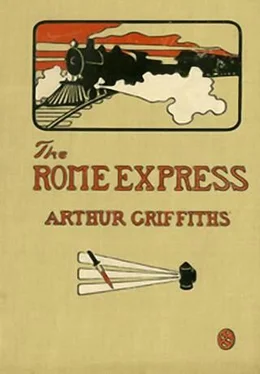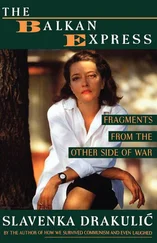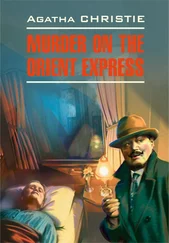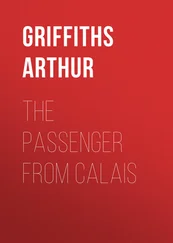Arthur Griffiths - The Rome Express
Здесь есть возможность читать онлайн «Arthur Griffiths - The Rome Express» весь текст электронной книги совершенно бесплатно (целиком полную версию без сокращений). В некоторых случаях можно слушать аудио, скачать через торрент в формате fb2 и присутствует краткое содержание. Жанр: Детектив, на английском языке. Описание произведения, (предисловие) а так же отзывы посетителей доступны на портале библиотеки ЛибКат.
- Название:The Rome Express
- Автор:
- Жанр:
- Год:неизвестен
- ISBN:нет данных
- Рейтинг книги:3 / 5. Голосов: 1
-
Избранное:Добавить в избранное
- Отзывы:
-
Ваша оценка:
- 60
- 1
- 2
- 3
- 4
- 5
The Rome Express: краткое содержание, описание и аннотация
Предлагаем к чтению аннотацию, описание, краткое содержание или предисловие (зависит от того, что написал сам автор книги «The Rome Express»). Если вы не нашли необходимую информацию о книге — напишите в комментариях, мы постараемся отыскать её.
The Rome Express — читать онлайн бесплатно полную книгу (весь текст) целиком
Ниже представлен текст книги, разбитый по страницам. Система сохранения места последней прочитанной страницы, позволяет с удобством читать онлайн бесплатно книгу «The Rome Express», без необходимости каждый раз заново искать на чём Вы остановились. Поставьте закладку, и сможете в любой момент перейти на страницу, на которой закончили чтение.
Интервал:
Закладка:
"Would it not be sufficient if I made myself known to M. Galipaud?" suggested the Italian. "I have seen him here, I should recognise him-"
"That is not so certain; he may have changed his appearance. Besides, he does not know the latest developments, and might not be very cordial."
"You might write me a few lines to take to him."
"I think not. We prefer to send Block," replied the Chief, briefly and decidedly. He did not like this pertinacity, and looked at his colleagues as though he sought their concurrence in altering the arrangements for the Italian's mission. It might be wiser to detain him still.
"It was only to save trouble that I made the suggestion," hastily put in Ripaldi. "Naturally I am in your hands. And if I do not meet with the maid at the hotel, I may have to look further, in which case Monsieur-Block? thank you-would no doubt render valuable assistance."
This speech restored confidence, and a few minutes later the two detectives, already excellent friends from the freemasonry of a common craft, left the station in a closed cab.
CHAPTER IX
"What next?" asked the Judge.
"That pestilent English officer, if you please, M. le Juge," said the detective. "That fire-eating, swashbuckling soldier, with his blustering barrack-room ways. I long to come to close quarters with him. He ridiculed me, taunted me, said I knew nothing-we will see, we will see."
"In fact, you wish to interrogate him yourself. Very well. Let us have him in."
When Sir Charles Collingham entered, he included the three officials in one cold, stiff bow, waited a moment, and then, finding he was not offered a chair, said with studied politeness: "I presume I may sit down?"
"Pardon. Of course; pray be seated," said the Judge, hastily, and evidently a little ashamed of himself.
"Ah! thanks. Do you object?" went on the General, taking out a silver cigarette-case. "May I offer one?" He handed round the box affably.
"We do not smoke on duty," answered the Chief, rudely. "Nor is smoking permitted in a court of justice."
"Come, come, I wish to show no disrespect. But I cannot recognise this as a court of justice, and I think, if you will forgive me, that I shall take three whiffs. It may help me keep my temper."
He was evidently making game of them. There was no symptom remaining of the recent effervescence when he was acting as the Countess's champion, and he was perfectly-nay, insolently calm and self-possessed.
"You call yourself General Collingham?" went on the Chief.
"I do not call myself. I am General Sir Charles Collingham, of the British Army."
"Retired?"
"No, I am still on the active list."
"These points will have to be verified."
"With all my heart. You have already sent to the British Embassy?"
"Yes, but no one has come," answered the detective, contemptuously.
"If you disbelieve me, why do you question me?"
"It is our duty to question you, and yours to answer. If not, we have means to make you. You are suspected, inculpated in a terrible crime, and your whole attitude is-is-objectionable-unworthy-disgr-"
"Gently, gently, my dear colleague," interposed the Judge. "If you will permit me, I will take up this. And you, M. le General, I am sure you cannot wish to impede or obstruct us; we represent the law of this country."
"Have I done so, M. le Juge?" answered the General, with the utmost courtesy, as he threw away his half-burned cigarette.
"No, no. I do not imply that in the least. I only entreat you, as a good and gallant gentleman, to meet us in a proper spirit and give us your best help."
"Indeed, I am quite ready. If there has been any unpleasantness, it has surely not been of my making, but rather of that little man there." The General pointed to M. Flocon rather contemptuously, and nearly started a fresh disturbance.
"Well, well, let us say no more of that, and proceed to business. I understand," said the Judge, after fingering a few pages of the depositions in front of him, "that you are a friend of the Contessa di Castagneto? Indeed, she has told us so herself."
"It was very good of her to call me her friend. I am proud to hear she so considers me."
"How long have you known her?"
"Four or five months. Since the beginning of the last winter season in Rome."
"Did you frequent her house?"
"If you mean, was I permitted to call on her on friendly terms, yes."
"Did you know all her friends?"
"How can I answer that? I know whom I met there from time to time."
"Exactly. Did you often meet among them a Signor-Quadling?"
"Quadling-Quadling? I cannot say that I have. The name is familiar somehow, but I cannot recall the man."
"Have you never heard of the Roman bankers, Correse & Quadling?"
"Ah, of course. Although I have had no dealing with them. Certainly I have never met Mr. Quadling."
"Not at the Countess's?"
"Never-of that I am quite sure."
"And yet we have had positive evidence that he was a constant visitor there."
"It is perfectly incomprehensible to me. Not only have I never met him, but I have never heard the Countess mention his name."
"It will surprise you, then, to be told that he called at her apartment in the Via Margutta on the very evening of her departure from Rome. Called, was admitted, was closeted with her for more than an hour."
"I am surprised, astounded. I called there myself about four in the afternoon to offer my services for the journey, and I too stayed till after five. I can hardly believe it."
"I have more surprises for you, General. What will you think when I tell you that this very Quadling-this friend, acquaintance, call him what you please, but at least intimate enough to pay her a visit on the eve of a long journey-was the man found murdered in the sleeping-car?"
"Can it be possible? Are you sure?" cried Sir Charles, almost starting from his chair. "And what do you deduce from all this? What do you imply? An accusation against that lady? Absurd!"
"I respect your chivalrous desire to stand up for a lady who calls you her friend, but we are officials first, and sentiment cannot be permitted to influence us. We have good reasons for suspecting that lady. I tell you that frankly, and trust to you as a soldier and man of honour not to abuse the confidence reposed in you."
"May I not know those reasons?"
"Because she was in the car-the only woman, you understand-between Laroche and Paris."
"Do you suspect a female hand, then?" asked the General, evidently much interested and impressed.
"That is so, although I am exceeding my duty in revealing this."
"And you are satisfied that this lady, a refined, delicate person in the best society, of the highest character,-believe me, I know that to be the case,-whom you yet suspect of an atrocious crime, was the only female in the car?"
"Obviously. Who else? What other woman could possibly have been in the car? No one got in at Laroche; the train never stopped till it reached Paris."
"On that last point at least you are quite mistaken, I assure you. Why not upon the other also?"
"The train stopped?" interjected the detective. "Why has no one told us that?"
"Possibly because you never asked. But it is nevertheless the fact. Verify it. Every one will tell you the same."
The detective himself hurried to the door and called in the porter. He was within his rights, of course, but the action showed distrust, at which the General only smiled, but he laughed outright when the still stupid and half-dazed porter, of course, corroborated the statement at once.
"At whose instance was the train pulled up?" asked the detective, and the Judge nodded his head approvingly.
To know that would fix fresh suspicion.
But the porter could not answer the question. Some one had rung the alarm-bell-so at least the conductor had declared; otherwise they should not have stopped. Yet he, the porter, had not done so, nor did any passenger come forward to admit giving the signal. But there had been a halt. Yes, assuredly.
Читать дальшеИнтервал:
Закладка:
Похожие книги на «The Rome Express»
Представляем Вашему вниманию похожие книги на «The Rome Express» списком для выбора. Мы отобрали схожую по названию и смыслу литературу в надежде предоставить читателям больше вариантов отыскать новые, интересные, ещё непрочитанные произведения.
Обсуждение, отзывы о книге «The Rome Express» и просто собственные мнения читателей. Оставьте ваши комментарии, напишите, что Вы думаете о произведении, его смысле или главных героях. Укажите что конкретно понравилось, а что нет, и почему Вы так считаете.












